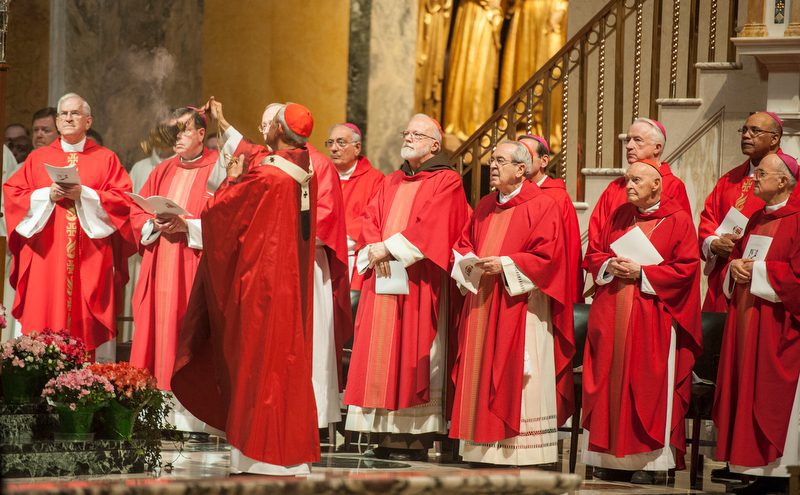Why Didn’t Uncle Ted Come To Dinner?

A reader writes:
Every year from 1989-2016, The Catholic University of America put on their annual “American Cardinals Dinner.” Basically, it was a Mass, followed by a black-tie banquet to raise money for CUA every year. They try to have it in a different city each year, and get as many American Cardinals to show up as possible, along with the hosting bishop and the papal nuncio.
Anyway, from 2001-2006, Cardinal McCarrick attended each and every dinner in his capacity as Archbishop of Washington DC and as a Cardinal. However, something interesting happened in 2007: he stopped attending the dinners. Even Donald Wuerl would attend, as Archbishop before he was even made a Cardinal, but McCarrick stopped attending from 2007-2012. Then, as if out of nowhere, he started attending the Dinner again in 2013 (the year Francis became pope, and the dinner was back in DC). He attended subsequent dinners in 2014 and 2015. The dinner was canceled in 2016 because of the Papal Visit to DC (the dinner usually takes place in the spring), and I haven’t seen any evidence of dinners in 2017 and 2018.
All of this information is publicly available at: https://cardinalsdinner.cua.edu On the sidebar, there’s a list of their previous dinners, along with photo galleries that prove McCarrick was not there during those years.
It’s true. I looked at the photo gallery. Uncle Ted stops showing up from 2007-2012, but then he’s back in the picture after Francis is made pope.
In writing up a memo on these documents that were entrusted to me, as Delegate for Pontifical Representations, on December 6, 2006, I wrote to my superiors, Cardinal Tarcisio Bertone and the Substitute Leonardo Sandri, that the facts attributed to McCarrick by Littleton were of such gravity and vileness as to provoke bewilderment, a sense of disgust, deep sorrow and bitterness in the reader, and that they constituted the crimes of seducing, requesting depraved acts of seminarians and priests, repeatedly and simultaneously with several people, derision of a young seminarian who tried to resist the Archbishop’s seductions in the presence of two other priests, absolution of the accomplices in these depraved acts, sacrilegious celebration of the Eucharist with the same priests after committing such acts.
In my memo, which I delivered on that same December 6, 2006 to my direct superior, the Substitute Leonardo Sandri, I proposed the following considerations and course of action to my superiors:
Given that it seemed a new scandal of particular gravity, as it regarded a cardinal, was going to be added to the many scandals for the Church in the United States,
and that, since this matter had to do with a cardinal, and according to can. 1405 § 1, No. 2˚, “ipsius Romani Pontificis dumtaxat ius est iudicandi”;I proposed that an exemplary measure be taken against the Cardinal that could have a medicinal function, to prevent future abuses against innocent victims and alleviate the very serious scandal for the faithful, who despite everything continued to love and believe in the Church.
More:
But finally I learned with certainty, through Cardinal Giovanni Battista Re, then-Prefect of the Congregation for Bishops, that Richard Sipe’s courageous and meritorious Statement had had the desired result. Pope Benedict had imposed on Cardinal McCarrick sanctions similar to those now imposed on him by Pope Francis: the Cardinal was to leave the seminary where he was living, he was forbidden to celebrate [Mass] in public, to participate in public meetings, to give lectures, to travel, with the obligation of dedicating himself to a life of prayer and penance.
I do not know when Pope Benedict took these measures against McCarrick, whether in 2009 or 2010, because in the meantime I had been transferred to the Governorate of Vatican City State, just as I do not know who was responsible for this incredible delay. I certainly do not believe it was Pope Benedict, who as Cardinal had repeatedly denounced the corruption present in the Church, and in the first months of his pontificate had already taken a firm stand against the admission into seminary of young men with deep homosexual tendencies. I believe it was due to the Pope’s first collaborator at the time, Cardinal Tarcisio Bertone, who notoriously favored promoting homosexuals into positions of responsibility, and was accustomed to managing the information he thought appropriate to convey to the Pope.
Now, this is interesting. Could it be that Archbishop Vigano is mistaken, and his 2006 memo was, in fact, taken seriously, and Benedict XVI did impose some restrictions on McCarrick shortly afterward? It would explain his absence from the Cardinals Dinner from 2007 through the rest of Benedict’s pontificate.
I thank the reader for his sleuthing. All of you, send what clues you have. You might have the information that solves this mystery. E-mail me at rod — at — amconmag — dot — com if you have solid leads or clues.
Subscribe for as little as $5/mo to start commenting on Rod’s blog.